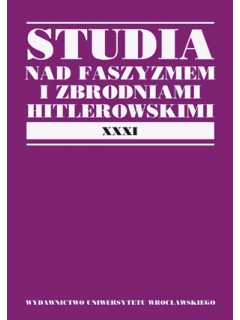

Articles

POLISH INTERPRETATIONS OF ITALIAN FASCISM’S ORIGINS 1922–1939
Although over sixty years have passed since the fall of Italian fascism, this political system still occasions many lively disputes among contemporary historians, legal scholars and political scientists. The article presents Polish interpretations of Italian fascism’s origins during the 1922–1939 period. Five categories of interpretation can be distinguished in this respect which were specific for both left and right of the political proscenium of the Second Commonwealth. Fascism was seen as a qualified version of nationalism, as a veterans’ movement, as a movement which was either contrary to or related to communism, or as an inevitable result of historical process. Many of the interpretations proposed by Polish lawyers and publicists were identical or similar to the evaluations later given by E. Fromm, T. Adorno, H. Arendt, K. Mannheim, E. Canetti, H. Marcuse, E. Voegelin, L. Strauss, E. Cassirer, H. Rauschning, M. Horkheimer, P. Drucker, H. Kohn, F. Borkenau and W. Gurian. It should be noted that the first observations on the subject of Italian fascism, especially those enunciated in the twenties, were mostly descriptive and incomplete. An in-depth consideration on the nature of Italian totalitarian system, particularly on the part of Polish legal scholars, occurred only during the thirties. It should also be pointed out that Italian fascism evoked less negative associations than its Nazi counterpart. The latter was since the beginning – at least according to some – perceived as a threat to Polish state and national existence.